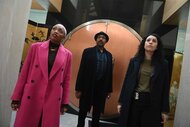Create a free profile to get unlimited access to exclusive show news, updates, and more!
The Irrational Tackles The Barnum Effect — and How It's Connected to Tarot Cards
Tarot cards have been around for hundreds of years, and Alec Mercer shares the theory behind why they're so popular.

You might recognize the art of divination from the Harry Potter book series, but it’s not just about waving wands and gazing into crystal balls. The practice tries to help see the future or discover hidden knowledge. One popular way to do that? Reading tarot cards.
That’s exactly what his sister Kylie, played by Travina Springer, was doing in the opening moments of Episode 3 of The Irrational, "The Barnum Effect". Not surprisingly, Alec Mercer, played by Jesse L. Martin, believes tarot card reading is nothing short of hocus pocus. When Kylie calls the practice divination, Alec instead calls it the Barnum effect.
What is the Barnum Effect?
“It’s named after the showman himself, P.T. Barnum,” Alec said to Kylie, referring to the famed founder of the Barnum & Bailey Circus. “His fortune tellers would offer vague, general predictions that would apply to anybody, and convince folks they could see the future…if you don’t understand the science, everything looks like magic.”
The Decision Lab defines the Barnum Effect, also known as the Forer Effect, as "when individuals believe that generic information, which could apply to anyone, applies specifically to themselves."
How exactly do tarot cards work?
Tarot cards were first invented in Italy in the early 1400s when a fifth suit of 21 illustrated cards was added to the traditional four-suited pack, according to Britannica. But using tarots for fortune telling didn’t begin until about 1780 in France, and the pack of tarot cards grew to 78 cards by that point.
Every card has a meaning. The deck is usually shuffled by the fortune teller, and then a few cards are laid out in a special pattern called a spread, according to Britannica. The meanings of the cards can change depending on if they’re upside down when drawn, as well as things like the card’s position in the spread, and even the meanings of adjacent cards.
During The Irrational, Kylie flipped the “tower” card, which means chaos, destruction, trauma, disaster, loss — all bad things no one wants to see, according to The Tarot Guide. On the opposite end of the spectrum, she also flipped the “fool” card. This is a more positive card that usually means new beginnings or a new adventure. She also draws the “page of pentacles” before Alec leaves the home, which means good news in a money, business or career context. Kylie claims the tower card was right later in the episode as she’s talking to Alec, referring to both the deadly plane crash he’s helping to investigate, as well as finding out his ex-wife Marisa, played by Maahra Hill, is now dating.
It turns out the discussion of tarot cards and the Barnum effect wasn’t all a waste of time.
“See what you want to see, hear what you want to hear,” Kylie told Alec about the cards, prompting him to remember an experiment that uses the Barnum Effect.
For his students, Alec played a series of recorded phrases, with the words to the phrase displayed on a screen in the classroom and asked the students to write down what they heard.
“You heard the same thing every time,” he later reveals to the students, even though different phrases were written on the screen. “Our eyes and ears take in electrical signals which our brains interpret based on our expectations. We don’t see reality. We see our reality.”
This leads Alec to also solve the case at the center of the episode, which revolved around a tragic plane crash.
















